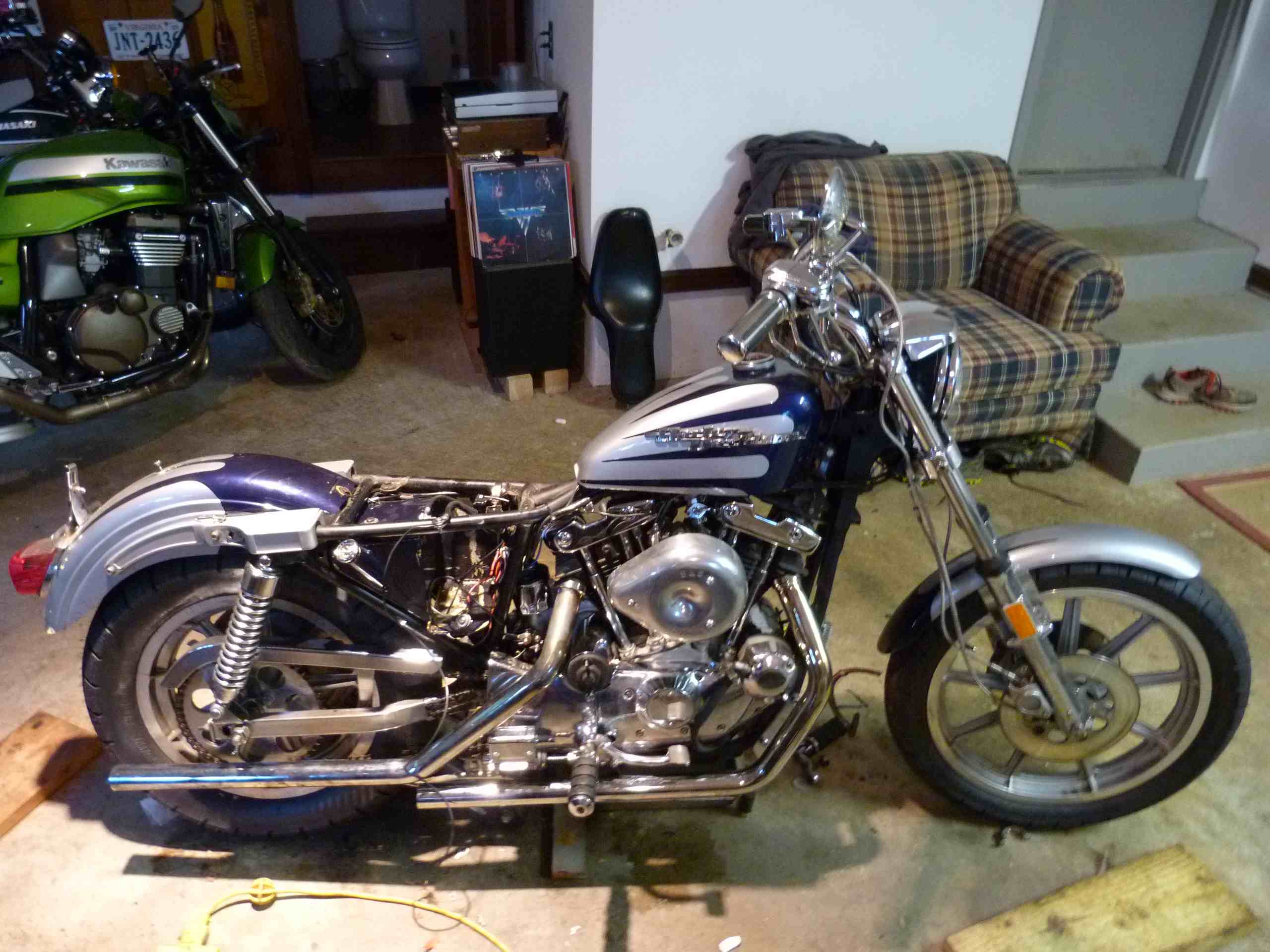If you’ve never dealt with an AMF-era Ironhead Sportster electric start problem, perhaps this will help you deal with it – learning from my fumbling around. Here’s the scenario:
I agreed to try to sort out an ’80 Sportster that had been sitting for a long time. Bike needed a pretty major going-through, including cleaning/rebuilding the carburetor, rebuilding the brakes (front and rear), major tune-up, clutch and some emergency wiring triage.
I finally got the bike running. Then, it stopped running. Well, the starter stopped working.
The ’80 Sporty has electric start – no back-up kicker. First sign of trouble was no reaction (and no satisfaction) when I pushed the ignition button. Sometimes it would spin. But – more and more often – it wouldn’t.
First suspect was the breaker (not fuse) in the ignition circuit. It was bad. So, replaced. But while the solenoid now “clicked,” the starter seemed – sounded like – it was just spinning. The engine was not turning. So I removed the primary cover (opposite side that the starter and solenoid are on) in order to see what was going on, if possible.
I saw that the starter’s pinion gear was turning – and meshing – with the larger gear on the shaft that, in turn, is supposed to turn the gear that meshes with the big sun gear on the back of the clutch basket – and turn the engine over. But while the latter gear was meshing, something was slipping. The next step was to remove the casting that holds the starter motor, the solenoid and the mechanism (gears, shaft, etc.) that operates the works.
I found a couple of possible culprits.
First, the needle bearing cup that’s pressed into the casting that holds the starter motor. There was a lot of play – and some metal shavings, too. The shaft that rides in this bearing – the one the gears mount on – was a little wobbly-feeling. I replaced the needle bearing with a new one (bronze gasket, too).
Next, I cleaned and checked the gears, looking for chipped teeth, wear and so on. Well, I would have if I could have slipped them off the shaft. But the shaft was scored – and the big metal spacer that’s supposed to slide on and off (and rotate freely on the shaft) was fused onto the shaft.
This could be the issue!
I finally got the works apart and then used a drill and some light sandpaper (1500-2000) to polish the shaft. An old Harley mechanic hipped me to this little trick. Insert the shaft into the drill, just like you’d do with a drill bit. Now you have a low-bucks lathe! Carefully polish the contact surface until it’s smooth again. Clean thoroughly with solvent to remove any shavings. Then – this is my “trick” – wash everything down with light machine oil and re-assemble.
Back on the bike, the starter mechanism appears to be healthy. Seems to line up – and mesh up – as it ought to. The starter and solenoid and breaker are known good. The bike should start.
We’ll see whether it will.
It is, after, all, a Harley!
If you value independent media, please support independent media. We depend on you to keep the wheels turning!
Our donate button is here.
If you prefer to avoid PayPal, our mailing address is:
EPautos
721 Hummingbird Lane SE
Copper Hill, VA 24079
PS: EPautos stickers are free to those who sign up for a $5 or more monthly recurring donation to support EPautos, or for a one-time donation of $10 or more. (Please be sure to tell us you want a sticker – and also, provide an address, so we know where to mail the thing!)











First, the needle bearing cup that’s pressed into the casting that holds the starter motor. There was a lot of play – and some metal shavings, too. The shaft that rides in this bearing – the one the gears mount on – was a little wobbly-feeling. I replaced the needle bearing with a new one (bronze gasket, too).
Yep, now all pilot bearings are needle style. When you do a clutch replacement they seem to last a minute or two or a couple moves into first. I just find a bronze bushing of the same size and give somebody the needle bearing. At least they make a tool so you can fill the old needle bearing with grease and it fits close enough to drive the old one out with the pressure of the grease as you drive the tool in.